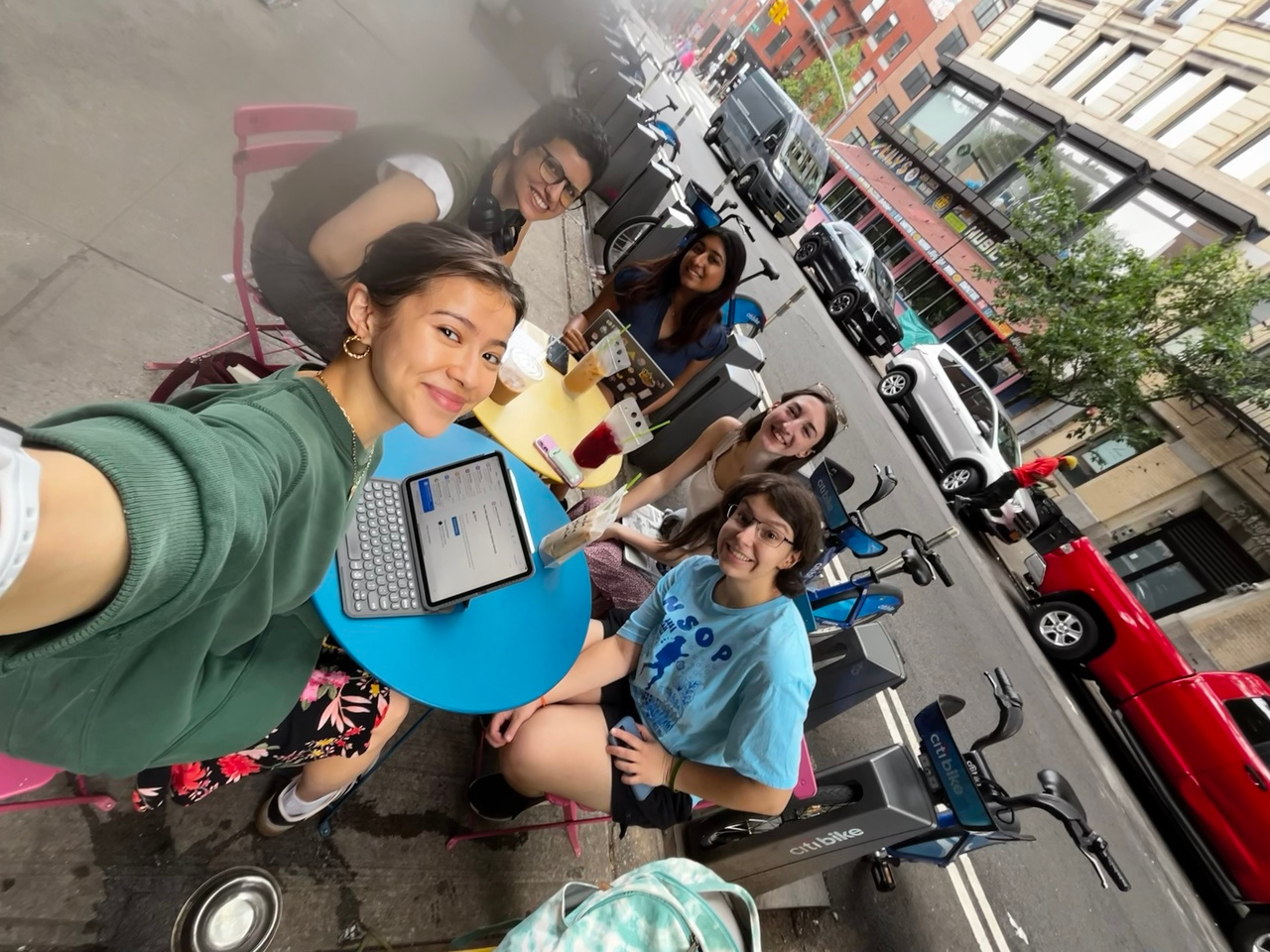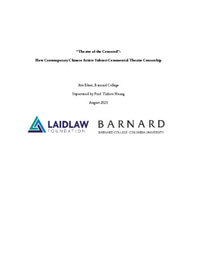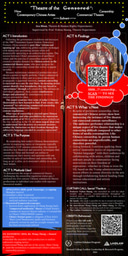Field Journal: Weeks 1-2

WEEK 1:
During week 1, I began reading and collecting as much knowledge as I could on the existing scholarly conversation surrounding censorship and theatre in China. As I discovered more and more avant-garde theatre directors and read analyses of performances in which the writer analyzed the politically-subversive implications of that performance, I gained inspiration for how to structure my own research.
However, I also felt lost because I was still unsure how to narrow down my initially broad research question, which had been "How do theatre artists in China adapt to censorship constraints in a way that innovates theatre?". The Laidlaw 2-day Leadership workshop/orientation immensely helped guide me towards that narrowing-down, though. We shared our ideas with one another in small groups, then circled around the room providing sticky-note suggestions and feedback to one another’s topic, question and methodology outlines. This exercise was my first experience of the gift it is to be part of this collaborative and diverse Laidlaw community. Though everyone is studying something totally different, our shared vision to bridge theory with meaningful action has united us in such a way that we can value the different perspectives and insights everyone brings from their unique field and experiences. The connections we made between our areas of research, no matter how different the topics seemed, embodied the interdisciplinary nature that first attracted me to this program. We were encouraged to see how we could support each other through our different areas of knowledge, showing me that this is a space where every perspective is valued for the different lens it contributes to a conversation—good scholarly sportsmanship!
Many of the suggestions I received from my peers were incredibly helpful because I already knew from my preliminary meeting with my faculty mentor Professor Yizhou Huang that my research question had to get more specific, but I hadn’t been sure where to start. Seeing the questions my cohort posed–such as “are you looking at China as a whole, or comparing specific regions?,” “what type of innovations can you define?” and “what genre of theatre are you looking at?” gave me a great starting point to know what type of background research I could start with to narrow down my question.
WEEK 2:
It is so cool to realize that the scholarly field I am researching is so specific and niche that my own faculty mentor, Professor Huang, is truly a leading contributor and voice in the many works I've been discovering! Every time we meet and I tell her the directors or productions I've read about, she has told me about a relevant piece she's written on those artists. I feel so lucky and excited to get to work with and learn from a true expert on my interest. The main piece I annotated this week was her 2020 review of Wang Chong’s “Ibsen in One Take (2012)” production, in which she argues that, despite the technological innovations and experimental creativity that Wang’s production utilized, representing his “New Wave Theatre” movement, the production failed to clearly communicate the underlying socio-political message that Wang sought to embed through his abstract multimedia staging. Professor Huang’s analysis raises an important question I want to touch on in my paper: while the innovations of experimental theatre allow for artists to include multi-layered messages that bypass government censorship, to what extent is this “bypassing” a successful exercise of free expression when audiences cannot understand those subtleties?
This week, I met with Professor Huang to talk to her about the direction of my research as I narrow down the scope of my analysis. I brought up the new focus that her analysis had led me to, regarding what can be defined as a "successful" subversion of censorship: Wang constantly performs his shows for smaller audiences and in unofficial venues, since the limited reception/exposure makes it easier to evade monitoring/government censors. With Ibsen in One Take, while a normal-sized venue, the political nuance of his messaging wasn’t as clear due to his technological innovations (as Professor Huang wrote), which therefore obscured the sociopolitical commentary on Chinese gender politics that he wanted to convey.
- Whether from limited audience exposure or limited audience understanding, in both cases Wang’s experimental risks and techniques managed to evade censorship while simultaneously limiting how clearly the underlying message registers with audiences;
- How do experimental theatre-makers define or contend with this complexity? Do they still see this as a form of “success” in gathering more agency and freedom of expression, solely for finding ways to express themselves even if it doesn’t fully register with everyone?
My conversation with Professor Huang was really insightful in guiding the future direction of my research because she told me there's no way to quantify the sociopolitical difference that a production can make since that is a very subjective opinion, especially since people's own receptions and ideas of a show can change and evolve as time passes. She said censorship is difficult to measure in the context of this type of question; in the context of censorship, it's a partial success if the thing you want to make at least has an audience, regardless of what they understand from it! As long as there is space for experimental, potentially subversive performances to exist, there's space for people to entertain the POSSIBILITY of dialogue happening. Whether it happens or not is another thing, but the space itself is precious. That will be the tangible focus, then, of my research.
CURRENT CHALLENGES (entering WEEK 3):
One source I am reading to help structure my own analysis is a chapter from The Palgrave Handbook of Theatre Censorship, called “The Detour Around Censorship: Private Theatres and Independent Performance Groups in Guangzhou, China” (2024). The abstract describes what is essentially the same objective that I have for my research: “Through the four case studies, this chapter scrutinises the intensification of theatre censorship due to geo-political reasons since President Xi’s inspection tour in October 2018 and analyses the strategies that the theatres and performance groups adopted to circumvent, resist or cooperate with censorship.” Though the focus and case study is different, the analysis of this chapter is exactly the angle I was wanting to take for my initial research question! My challenge, then, is that I want to be able to delineate what my unique angle and contribution to this existing scholarly conversation will be.
Professor Huang told me that perhaps the significance of my research will lie in the fact that the scholarship within this particular field is relatively small; the coverage of certain artists in the context of Chinese censorship is limited, due to the risks faced by Chinese scholars who would otherwise want to publish work on this topic. For this reason, any new case study of a performance is valuable to growing the body of knowledge and analysis on contemporary Chinese artists in the theatre community. Perhaps, then, I just need to be selective and intentional on which performances I choose to analyze and HOW I choose to analyze them, so I know I am adding something new rather than covering something already done.


Please sign in
If you are a registered user on Laidlaw Scholars Network, please sign in